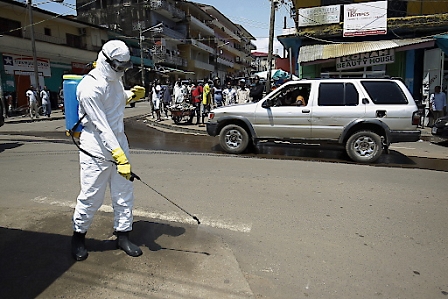Erstellt am: 13. 11. 2014 - 14:57 Uhr
The #AfricaStopEbola Song
“Dear parents / Follow the advice of medical authorities / Ebola came to hurt us / Respect their advice” The lyrics to the new song Africa Stop Ebola, are rather unpoetic – but this time directness is the name of the game.
There is no room for nuance with Ebola. The epidemic is ravaging communities. Health workers advance can only be halted if an informed population takes the appropriate measures to prevent or respond to infection and work with and not against the health workers.
“It was an initiative of African artists and myself to record a song to deliver a message to Africans about what they can do to help stop the spread of Ebola,” says Carlos Chirinos, an academic who has spent years in Africa and specialises in studying the power of radio to bring about positive change.
Chirinos says music is a very powerful tool to spread the message: “If a song is repeated on radio, it reaches a much wider audience than if it was just spoken or written down.” The lyrics are written in French, English and various local languages, including Kissi; Lingala and Bambara. No-one in the region should miss the central theme: Ebola the “invisible enemy” is a danger, but it can be treated and you have to trust the doctors.
“We have to act to protect our families,” is a blunt refrain in the song.
A Project of Passions and Compassion
Chirinos has gathered a remarkable team of musicians around him who collaborated in penning the song and sprinkled their magic to make sure the music penetrates the hearts and hopefully minds of those who hear it.
The artists featured include the main writers Kandia Kora and Sekou Kouyate, FM4-favourites Amadou & Mariam, Salif Keita, Oumou Sangaré and Kandia Kouyaté, and the Ivorian reggae star Tiken Jah Fakoly as well as Senegalese rapper Didier Awadi.
In Africa, vibrant radio stations play a strong role in community information campaigns. This is a memoir of my year as a novice journalism at Ghana's Vibe fm4
Chirinos describes it as a project of passion: “They all had some stories they could relate to. They all knew people who had fallen ill from Ebola or who had even died.” He says he had scetched out the basic message and the lyrical groundstones and then let the artists shape the song, while "sticking to the simple message".
Artists like Salif Keita and Fakoly aren’t just cultural icons, they are griots, trusted voices whose advice is heeded. Chirinos describes the long history of West African griots as the “holders of knowledge, sharers of oral history and givers of advice.” When they open their mouths, people listen, even those Africans who have become mistrustful of politicians and perhaps safety-wrapped doctors.

EPA/AHMED JALLANZO
The musicians add their distinctive styles to the song, Chirinos says the artists settled on the reggae rhythm because “reggae is truly pan-African.”
The advice of the song is blunt. “Have confidence in your doctor” is one of the main refrains. “Go and see your doctor!” sings Mariam.
Counteracting Myths
Chirinos says one aim of the song is to rebuild trust and confidence in the health services:
“Misinformation is one of the great facilitators of the transmission of Ebola. There have been many cases in which people have gone to churches or traditional healers. There are loads of urban myths. For example, there has been recent research from Oxfam that suggests 42% of the people in Liberia think you can prevent Ebola infection by bathing in hot water with salt. This song is counteracting those myths.”
Dieses Element ist nicht mehr verfügbar
But despite the deadly seriousness of the subject matter, the song is upbeat and even uplifting. “There is hope” – sing the artists. “I assure you the doctors can help. Ebola can be stopped!”
Let's hope the message get's through. And the song can help in another positive way too – if you legally download it the proceeds go to the heroes of Medicins sans Frontieres who are fighting on the frontline against the epidemic. And, if you ask me, it is a pretty good tune in its own right.


